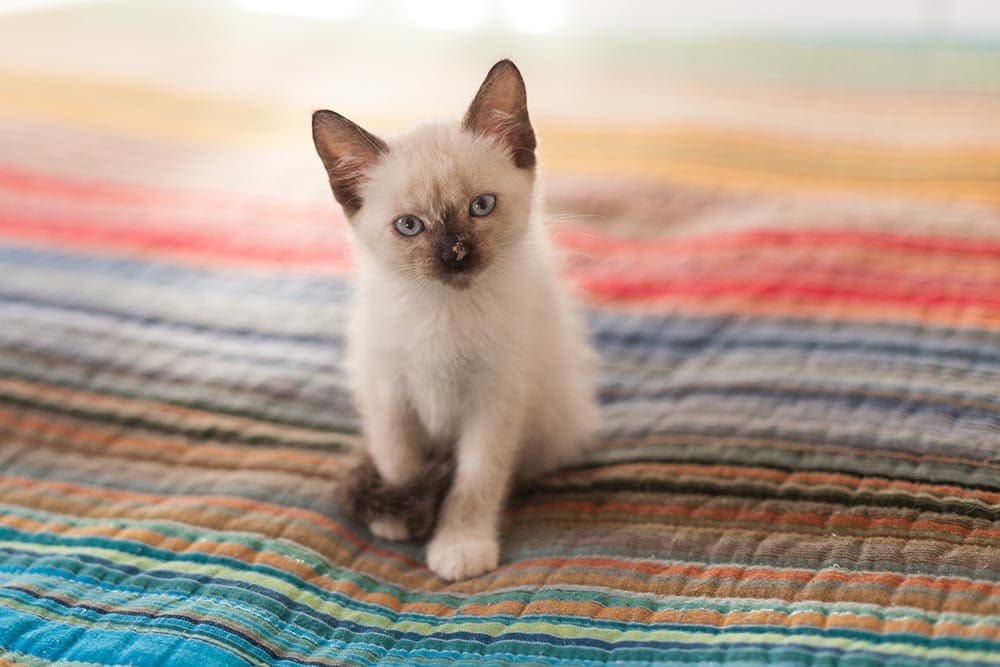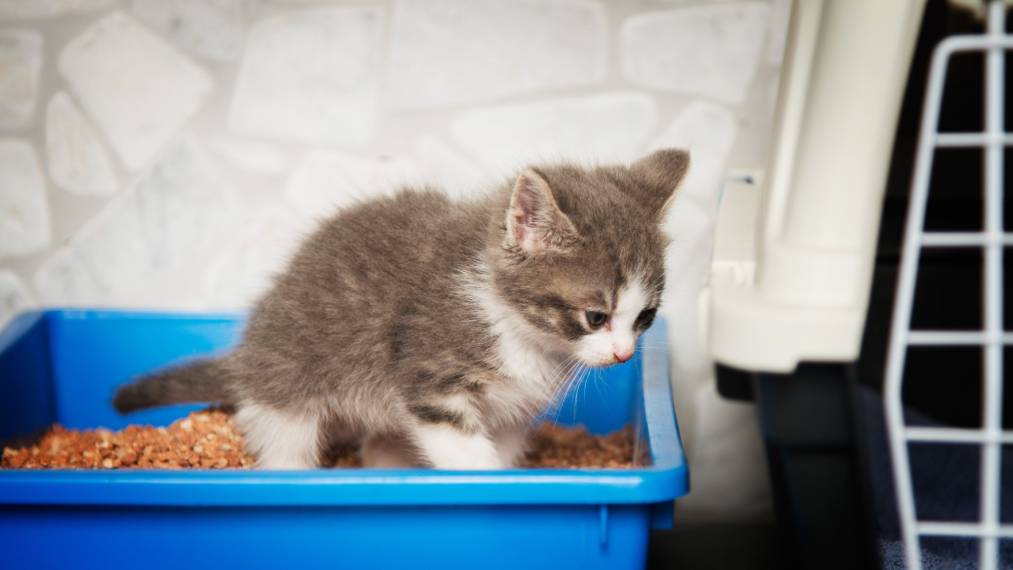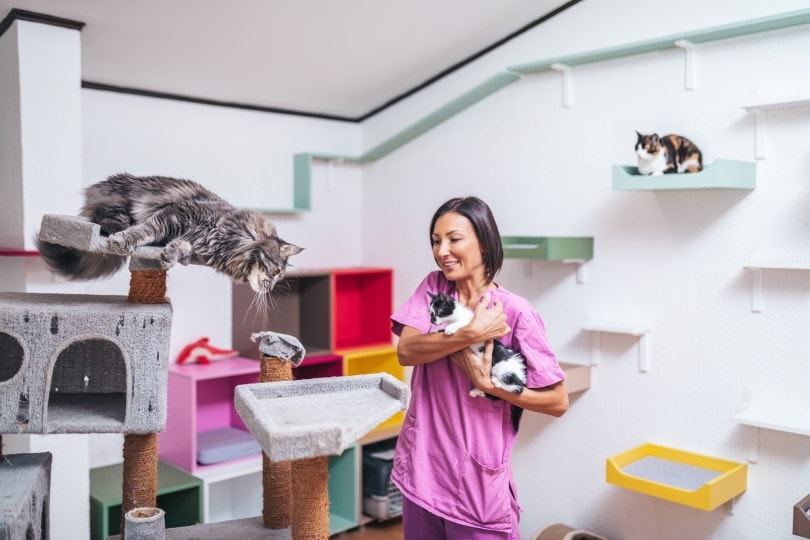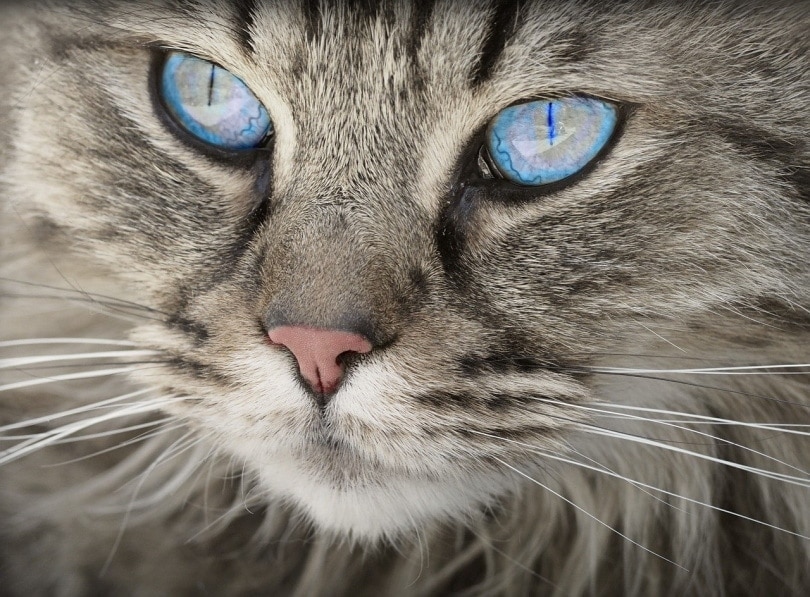How Do I Tell When My Kitten Needs to Pee or Poop? 4 Vet-Approved Signs

By Misty Layne
Updated on

Congratulations if you recently adopted a kitten; you’re in for a world of fun! Along with that fun comes responsibility, such as ensuring your kitten is fed and helping them figure out the litter box. To litter box train a kitten, you’ll first need to know when they’re telling you they need to pee or poop.
If this is the first kitten you’ve ever had, you may be unfamiliar with the signs and how to get a kitten to use a litter box. We’ll discuss all the ways your kitten might be telling you they need to go to the bathroom, as well as some pointers for litter box training your new tiny friend.
The 4 Signs Your Kitten Needs to Pee or Poop
If you know what signs to look for, you’ll find there are several ways your kitten will tell you when they need to pee or poop.
1. Squatting
The most obvious sign you’ll see is squatting. Cats squat to both pee and poop, though the positions will look slightly different. If your kitten is pooping, there will be more of a hunched back and raised tail, while peeing will be more of aiming the pelvis toward the ground. If you see your kitten assuming either of these positions outside the litter box, you have seconds before you have an accident on your hands.

2. Vocalizations
Another of the obvious signs your kitten needs to pee or poop is by verbally letting you know. If your pet can’t find the litter box or is unable to get to it (or get into it), they may start with excessive meowing to alert you.
Trust us; your kitten doesn’t want to go to the bathroom in an open space such as your bedroom any more than you want them to. They would much rather go to a more private place where they can bury the waste.
3. Scratching
You may also see your kitten scratching at the ground if they need to go to the bathroom. Cats are wired to bury their waste; in the wild, it helps hide it from predators. If your kitten suddenly starts pawing at the ground, there’s a good chance they’re about to pee or poop, so get them to the litter box as soon as possible.

4. Increased Activity
Finally, the less apparent signs your kitten may need to pee or poop are hyperactivity and restlessness. It may seem strange to us, but when cats feel discomfort, such as the urge to pee or poop, they can end up getting a bit hyperactive.
They might get the zoomies or try to climb the walls. Of course, it could just be them playing, so you’ll need to see if they’re exhibiting any of the other signs of needing the bathroom. They may also become restless due to the discomfort of needing to pee or poop.
How to Get a Kitten to Use the Litter Box
Luckily for us cat owners, kittens are pretty good about figuring out the litter box is where they need to go to the bathroom. You can help them along with this idea by providing more than one litter box in the home and directing them to one if you see signs of them needing to pee or poop.
You can also need to try out a few different types of litter to find one they like because if they hate the litter, they won’t use the box. Also, ensure the litter box is in a quieter area of the home so your kitten will have privacy while using it.
If your kitten has an accident outside the litter box, it’s best not to yell or have a negative reaction. Young kittens don’t have full control over their bladders, so they may be unable to hold them until they reach the litter box.
Instead of voicing your displeasure about the accident, don’t react; clean up the mess with a non-ammonia cleaner that eliminates the smell so the kitty won’t be tempted to go there again.

Another good way to help your kitten get used to the idea of a litter box is to follow a routine. If you take them to the litter box about 15 minutes after meals or drinking, they will typically need to pee or poop. Thus, taking them to the litter box after food or water will get them used to the idea of what the box is for.
Finally, if your kitten is 4 weeks or under, you may need to help them go to the bathroom, as kittens that young can’t go on their own. Typically, kittens are still with their mothers at that age, and mama cats will stimulate them to help them pee and poop. Young kittens need to be manually stimulated using a lukewarm, damp towel. Use gentle strokes to imitate their mother’s licking stimulus.
Conclusion
Kittens can and will let you know when they need to pee or poop; you just need to know what to look for. If your kitten is scratching around the ground, meowing excessively, acting restless or hyperactive, or is in the process of squatting to eliminate, you should redirect them to the litter box right away. But if an accident occurs, don’t get upset over it. Instead, clean up the mess and don’t react otherwise.
Your kitten should learn the purpose of the litter box rather quickly, but you can always encourage them to use it by making sure more than one litter box is placed within easy reach and picking litter they like. Have patience; soon, you’ll find your kitten has no accidents!
See also:
- Why Won’t My Kitten Poop? 6 Vet Reviewed Reasons & Solutions
- Why Do Cats Bury Their Poop? 3 Vet-Reviewed Reasons
Featured Image Credit: Guillermo Rico, Unsplash













